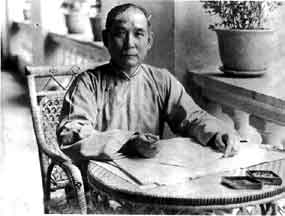1912 Sun Yat-Sen Founds Kuomintang
In an effort to unify the country, Sun Yat-sen resigned in February to allow Yuan Shih K'ai to be elected President. At the same time, political parties were forming and Sun Yat-sen established the Kuomintang party. The party was dedicated to the creation of a parliamentary system in China.
TSun Yat-sen founded the Kuomintang (KMT), also known as the Chinese Nationalist Party, in 1912. The party's name translates to the "National People's Party" and was established to promote Chinese nationalism, democracy, and the welfare of the people.
Sun Yat-sen's political philosophy, known as the Three Principles of the People, formed the basis of the Kuomintang's ideology. These principles are:
- Nationalism (Minzu) - The goal was to overthrow the Qing Dynasty and end foreign domination in China. This principle emphasized the importance of a unified and independent China under a single government.
- Democracy (Mínquán) - The establishment of a democratic system of governance in China that would ensure people's participation in the decision-making process.
- Social Welfare (Mínshēng) - The aim was to address social and economic inequalities and improve the overall well-being of the Chinese people through land reforms, social programs, and industrial development.
After the establishment of the Republic of China in 1912, the Kuomintang faced various challenges, including internal power struggles and warlordism.
 >
>